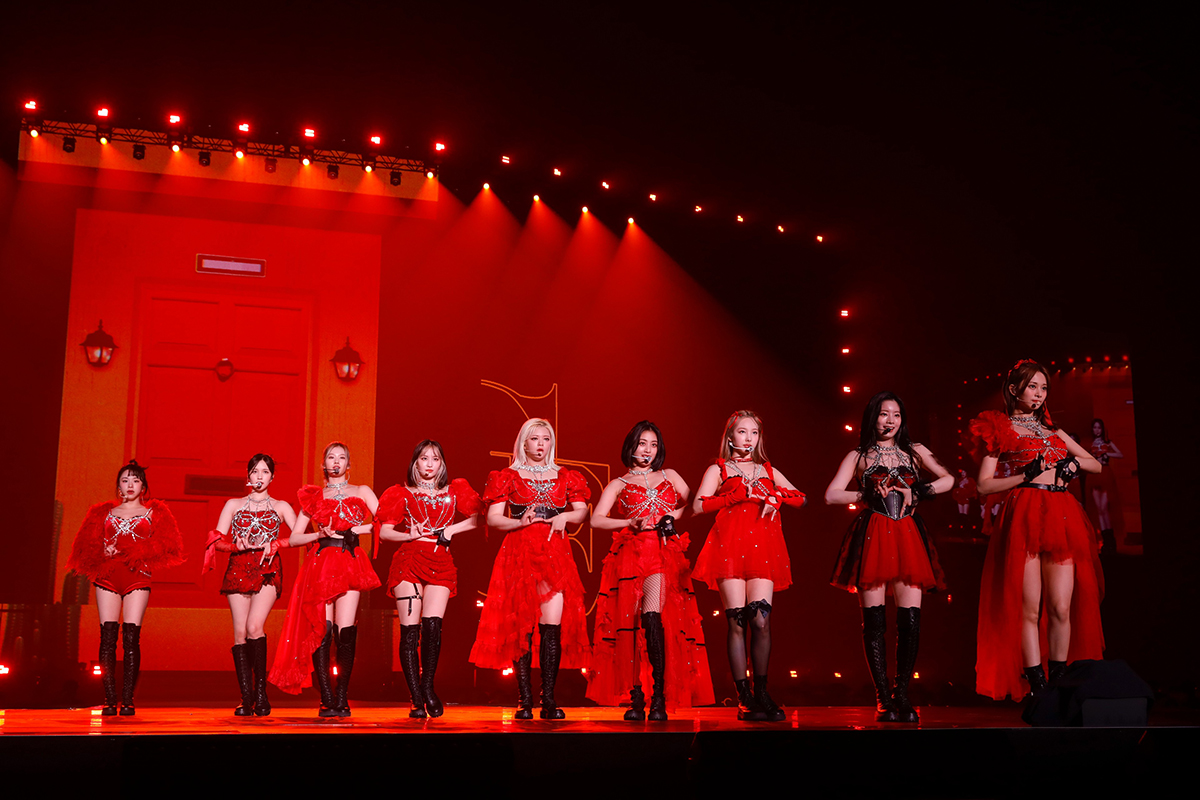그야말로 ‘K-pop의 세계화’라는 말이 어울리는 요즘이다. 빌보드 차트에 다수의 KPOP 그룹이 차트인 하는가 하면, 최근 미국의 소셜미디어 분석 플랫폼인 ‘넷베이스 퀴드(Netbase Quid)’가 발표한 ‘코첼라 밸리 뮤직 & 아츠 페스티벌’ 관련 SNS 언급량 상위 10명의 아티스트엔 에스파의 지젤과 카리나가 이름을 올리며 해리 스타일스, 빌리 아일리시 등과 어깨를 나란히 하기도 했다. 이처럼 팬덤은 전세계로 그 세력을 확장했고, 국내 대중들에게는 낯선 그룹이 탄탄한 해외 팬덤을 기반으로 역수입 되는 경우도 심심치 않게 보이고 있다. 레드 오션의 극한을 달리는 한국 대신, 제작 단계부터 시선을 글로벌 시장으로 돌리는 경우가 늘어나고 있는 상황이니, 무슨 말이 더 필요할까 싶다.
가만 생각해보면, 전세계의 관심을 흡수해 가는 과정에서 K-pop은 필요에 따라 그 모습을 바꾸어 왔다. 해외 진출 초기에는 보아와 같이 ‘철저한 로컬라이징’이 그 핵심에 있었다. 아직은 한국의 아이돌 신이 낯설게 여겨졌기에, 타국의 간판을 내걸기보다 그 나라의 콘텐츠로 자연스럽게 녹아드는 쪽을 택했던 시기였다. 더불어 이는 같은 아시아권인 ‘일본’이었기에 가능한 일이기도 했다. 야심차게 미국 진출을 노렸던 원더걸스는 서구권에 익숙한 레트로 스타일링을 비롯, <The DJ Is Mine>이나 <Like Money>와 같은 현지 트렌드를 반영한 싱글을 선보였으나 문화적 차이에 의한 한계를 보이며 아쉽게 활동을 마무리해야만 했다.

본격적으로 시작된 ‘외국인 멤버 영입’의 시대
2000년대 초중반 아시아권에서 한류가 큰 문화적 흐름으로 자리하던 때, 기획사들이 취한 전략은 바로 ‘타깃 국적의 멤버’를 포함해 팀을 구성하는 것이었다. 초반엔 중화권 멤버들이 전략의 주축으로 부상했다. 슈퍼 주니어의 한경을 필두로 미스에이의 페이와 지아, 에프엑스의 빅토리아, 그리고 여기에 야심차게 추진했던 엑소-M의 중국 구성원들까지. 천문학적인 규모의 시장을 노린 선택은 초반에는 문제 없이 돌아가는 듯 했지만, 이내 대륙의 자본을 감당하지 못한 채 대부분을 떠나 보내는 결말을 맞이했다. 이후 외국인 발굴은 점차 일본으로 집중되어 갔으며, 트와이스의 성공은 그것이 가장 실속있고 안전한 방향임을 다시금 증명했다. 2021년 이후 데뷔한 주요 기획사들의 걸그룹 중 외국인, 특히 일본인이 포함되어 있지 않은 그룹은 JYP의 엔믹스나 < 방과 후 설렘 >을 통해 결성된 클라씨 정도일 것이다. 그만큼 아시아권의 공략을 위해서라도, 타국의 인재를 발굴하는 것은 필수사항이 된 셈이다.
이 흐름에서 언급해야 할 것이 바로 오디션 서바이벌 프로그램의 역할이다. 대결과정에서 각자의 인간적인 매력을 조명하며 외국인 참가자와 대중간의 거리감을 좁힌 JYP의 <식스틴>이 대표적. 여기에 패러다임의 일대 변혁을 가져온 <프로듀스 101>의 성공 또한 주목할 만하다. 시청자들이 직접 영향력을 행사할 수 있게끔 한 방식도 이목을 끌었지만, 무엇보다 일부 기획사에 집중되어 있던 헤게모니의 균열을 가져왔다는 점 역시 중요했다.
대형 기획사에 휘둘리길 원치 않았던 엠넷은 자신들의 미디어 파워를 활용, 여러 기획사의 연습생들을 자신들의 인재풀로 활용함과 동시에 일본/중국 자본과의 결탁을 통해 외국 국적의 참가자 비중을 늘린 <프로듀스 48>과 <걸스플래닛999 : 소녀대전>을 연달아 런칭했다. 특히 조작방송 논란 후 방영된 <걸스플래닛999 : 소녀대전>의 경우 국내에서와는 달리 열광적인 해외 반응을 불러오며 오디션 프로그램의 타깃은 더 이상 한국이 아닌 해외 팬덤임을 공식적으로 알렸다. 물론 이들이 남긴 오명 또한 오롯이 그들이 지고 가야할 짐으로 남기도 했다.

현지화의 최종단계, ‘K’가 없는 K-pop 그룹
이 즈음 하여 또 하나의 전환점을 맞이한다. 바로 엠넷이 일본의 방송국 TBS, 연예기획사 요시모토 흥업과 손을 잡고 <PRODUCE 101 JAPAN>을 선보인 것. 한국과 동일한 포맷이었으나, 일부 예외를 제외하고는 모두 일본 개인 연습생을 대상으로 한다는 점이 많은 화제를 불러왔다. 물론 이전에 미국인들로만 구성된 ‘이엑스피 에디션(EXP EDITION)’이라는 사례가 있긴 했지만, 다소 실험에 가까운 시도였고 활동기간도 짧아 그 이후로는 ‘외국인들로 구성된 KPOP 그룹’에 대한 논의가 잠시 멈춰있었던 상황이었다.
방영되는 동안 성의 없는 참가자들의 태도와 부족한 실력이 많은 질타를 받았으며, 무엇보다 ‘한국인’이 없는 K-pop 그룹이 성립하는가에 대한 논쟁이 활발하게 오갔다. 이처럼 여러 이야깃거리를 불러왔던 프로그램은 성공리에 시즌 2까지 이어지며 제이오원(JO1)과 아이앤아이(INI)를 인기그룹의 반열에 올려놓았다. 일본의 기획사가 일본 멤버들로 꾸린 이 팀을 과연 ‘K-pop’으로 분류할 수 있는가. 이들의 성공은 K-pop의 개념을 재고해야 하는 상황으로 가져다 놓았다.
일본에 이러한 경향을 보다 임팩트있게 전파한 이들은 따로 있다. 바로 ‘니쥬(NiziU)’다. 프로듀스 시리즈와 달리 JYP가 일본인 그룹 제작을 위해 소니 뮤직과 손잡고 발족시킨 <Nizi Project>는, 예상을 훨씬 웃도는 대성공을 거두며 K-pop이 새로운 영역으로 접어드는 상황을 더욱 부채질 했다. 선발 전 과정은 TV 뿐 아니라 OTT 서비스인 훌루(Hulu)로 방영되며 시청자들의 접근성을 높였고, 자극적이지 않은 연출과 멤버들의 진정성으로 하여금 막판으로 향할 수록 폭발적인 반응을 불러오며 정식 데뷔도 전에 팀을 스타덤에 올렸다. 완성된 그룹으로서 첫 선을 보인 <make you happy>는 여성 그룹 최초로 1억 스트리밍을 돌파함과 동시에 일부 팬덤이 아닌 전세대를 강타하며 신드롬을 일으키는 등, 논란과는 별개로 ‘K-pop의 시스템에서 탄생한 일본 걸그룹’으로서 굳건히 자리하고 있는 상황이다,

지금까지와는 다른 모습으로 진화해 갈 K-pop을 기대하며
K-pop은 더 이상 한국만의 것이 아니다. 누군가는 우리나라만의 독자적인 기술을 아무 대가 없이 해외에 퍼주는 것 아니냐며 못마땅해 하는가 하면, 누군가는 외국인이 외국어로 부른 음악에 ‘K’라는 글자를 붙일 수 있냐고 되묻는다. 그럼에도 많은 기획사들은 다음 챕터로 ‘한국인과 한국어가 배제된 K-pop 그룹 제작’에 박차를 가하고 있다. 이미 SM은 각국의 도시를 거점으로 하는 NCT의 무한확장을 염두에 두고 있으며, JYP는 JYP USA를, 하이브는 하이브 아메리카를 설립해 인재 발굴과 영입에 힘을 쏟고 있다. FNC JAPAN은 서바이벌 프로그램 <Who is Princess?>를 거친 일본인 그룹 프리킬(PRIKIL)를 곧 데뷔시킬 계획이며, 연내에는 <Nizi Project 시즌 2> 격인 보이그룹 오디션까지 이어질 예정이다.
아직까지도 많은 의견이 오가지만, 어느덧 K-pop은 국경을 넘어 전세계가 공유하는 음악 비즈니스이자 시스템의 한 형태로 자리잡아가고 있다. 많은 해외의 제작자들은 고도화된 육성/제작 시스템을 벤치마킹하기 위해 한국을 찾고 있으며, 적극적인 투자 또한 마다하지 않는다. 연습생부터 데뷔에 이르는 체계적인 프로세스와 팀에 고유한 색을 입히는 A&R, 여기에 날이 갈수록 발전해 가는 화려한 퍼포먼스. ‘무국적’을 기반으로 규격화 된 현 KPOP 문법에서, 국가적 정체성으로서의 ‘K’는 상당 부분 옅어졌음은 부인하기 어려운 상황이다. 동시에 국적에 관계 없이 많은 이들이 벤치마킹하기를 원하는 세계 공통어로서의 콘텐츠가 되었다. 문화의 확산은 개인이나 집단의 힘으로 막을 수 있는 것이 아니다. 이제는 우리가 구축한 콘텐츠 파워가 전세계 곳곳에 어떻게 침투하고 진화해 갈지 가슴 설레며 지켜봐도 좋지 않을까. 좁은 시장에 가둬두기에 K-pop은 이미 세계의 중심에 깊숙이 들어와 있다.
<사진 제공 - 에스엠엔터테인먼트, JYP엔터테인먼트, Sony Music Entertainment (Japan) Inc.>
Localization of K-POP: how far has it evolved?
“The globalization of K-pop" is certainly a fitting phrase these days. Numerous K-pop groups make it onto the Billboard music charts, and Giselle and Karina of Aespa are on the list of the 10 most mentioned artists at the Coachella Valley Music and Arts Festival on social media according to Netbase Quid, an American social media-analyzing platform. The two K-pop female group members enjoy a level of popularity almost equal to that of Harry Styles and Billie Eilish. The fandom of K-pop groups has expanded throughout the world, with many domestically unfamiliar groups being “re-imported” into Korea owing to their strong overseas fandom and popularity. What more can be said of K-pop’s globalization when an increasing number of entertainment companies are eyeing the global market instead of the heavily saturated Korean market right from the start of the production phase of an idol group?
The history of K-pop shows that the industry was transfigured according to the needs that surfaced during the process of drawing the world’s interest. In the initial phase of expanding overseas, “thorough localization” was at the core of the strategy, as in the case of the singer Boa. Back then, because locals were unfamiliar with Korean idols and the musical scene, artists and their agencies chose to naturally blend into the essence of their target country. Such a strategy was feasible as they mainly targeted their nearest Asian neighbor, Japan. In the case of the Wonder Girls, they ambitiously ventured into the American market by styling themselves in retro fashion familiar to the Western audience and releasing singles like “The DJ is Mine” and “Like Money,” which reflected local musical trends. The all-female group, however, failed to overcome cultural differences and had to call it quits due to the lukewarm reception.
The period of “recruiting foreign members”
In the early and mid-2000s, when Hallyu (literally meaning Korean Wave, referring to the rising popularity of Korean culture overseas) became mainstream in Asia, entertainment companies adopted the strategy of including “a group member who is a national of their target country.” Initially, Chinese members emerged as the key individuals in this strategy. Starting with Han Geng of Super Junior, Miss A included Fei and Jia, F(x) included Victoria, and Exo-M incorporated multiple Chinese members. The plan targeting success in the almost infinitely large Chinese market appeared to work seamlessly at first but was foiled when the management companies could not match the Chinese capital offered to these members, all of whom eventually left their groups. Afterward, the search for foreign members shifted to Japan, and the success of Twice proved this modified plan to be the safest and most financially sensible path. Almost all of the all-female groups launched by major entertainment companies in Korea after 2021 include a foreign member, in particular a Japanese member, with the exception of JYP’s NMIXX or CLASS:y, which were formed through the TV show “Excitement After School.” Discovering talented foreign individuals has now become a necessity, even when the groups are targeting only the Asian market.
It is impossible to overlook the role of survival audition programs during this phase. JYP’s “Sixteen” is the most well-known case, in which it was able to close the cultural gap between foreign show participants and the audience by spotlighting the participants’ personal charms during the audition showdowns. The success of “Produce 101,” which revolutionized the paradigm of such audition shows, is noteworthy. Not only did the show allow viewers to influence the audition results, but it also cracked the hegemony of major entertainment companies.
Mnet, the producer of “Produce 101,” wished to be freed from the hold of large entertainment companies. The TV channel used their media power to their advantage, inviting idol trainees from various agencies and increasing the number of foreign participants with sponsorships from Japanese and Chinese companies in their shows such as “Produce 48” and “Girls Planet 999.” In particular, “Girls Planet 999,” which aired after a broadcast manipulation controversy, aroused greater enthusiasm overseas than in Korea, indicating that the target audiences of audition programs are no longer fandoms in Korea but those around the world. Of course, the disgrace left by them is also the burden they must continue to carry.
The final phase of localization: K-pop group without the “K”
Another turning point developed in the K-pop scene when Mnet partnered with the Japanese broadcasting company TBS and entertainment agency Yoshimoto to launch “Produce 101 Japan.” While the audition show followed the same format as its Korean counterpart, with the exception of a few all participants were Japanese music group trainees. Although the show “Expedition” featured all American members, it was closer to an experimental attempt with a short-lived active period, and the concept of “K-pop group comprising only foreign members” was not continued for some time afterward.
During the showing of “Produce 101 Japan,” there was considerable criticism over the insincere attitude of show participants and their lack of skills, but even more debate on the validity of a K-pop group that does not include a Korean member. The controversial show wrapped up successfully and even aired a second season, creating the popular Japanese boy bands JO1 and INI. Such outcomes provoked thoughts on whether it is appropriate to categorize groups with only Japanese members managed by Japanese agencies as K-pop groups.
However, the group that delivered a much bigger impact is NiziU. Unlike the Produce audition series, NiziU was borne through JYP’s effort to form a Japanese group, partnering with Sony Music to launch “Nizi Project.” The project greatly exceeded expectations and ended with tremendous success, expanding the boundaries of K-pop. The audition process was aired not only on television but also on the over-the-top media service platform Hulu, increasing audiences’ access to the show. Moreover, the non-provocative production and sincerity of members contributed to the show’s popularity and increased with every episode, launching them into stardom even before their official debut. The group’s first song, “Make You Happy,” broke a record, making them the first all-female group with over 100 million streams and creating a pattern throughout the world and not just connected to a particular fandom. All controversies aside, NiziU has established itself as “the Japanese girl group created through the K-pop system.”
In looking forward to K-pop that will evolve into another form…
K-pop is no longer a culture that belongs solely to Korea. Some people are unhappy that we are giving away our country’s excusive technology and skills to others and receiving nothing in return, while others question whether it is valid to brand a foreign song sung by foreigners as K-pop. Despite these misgivings, numerous entertainment agencies are already accelerating into the next chapter of K-pop—“forming K-pop groups that do not include Korean members or the Korean language.” SM is looking at the infinite expansion of their boy band NCT by setting up bases in major cities around the world, while JYP and Hybe are establishing the American subsidiaries JYP USA and Hybe America, respectively, expending considerable efforts in search of new talents. FNC Japan, the Japanese branch of FNC, is preparing to debut their all-Japanese all-female group PriKil, which was formed through the survival audition program “Who is Princess.” They are also launching an all-male group audition program that is similar to “Nizi Project” sometime this year.
Despite varying opinions, K-pop is certainly becoming rooted as a form of a musical business and system that is shared globally. Numerous foreign producers are visiting Korea to benchmark the advanced training and production system of K-pop and actively investing in the industry. The systematic process from managing potential idols as trainees to their official launches, adding unique flair to each team through A&R, and the ever-evolving flashy performance of these groups are all elements that attract foreign producers. It is undeniable that the significance of the “K” in K-pop has faded in the current industry scene, which has made going “nationless” a standard. K-pop has become common global content that is sought after by many regardless of nationality. The diffusion of culture cannot be blocked by individuals or groups. We should be able to enjoy, with a hopeful thrill, how the content power we have built will penetrate cultures and evolve around the globe. K-pop has moved too close to the center stage of the world to cage it within a limited market.












